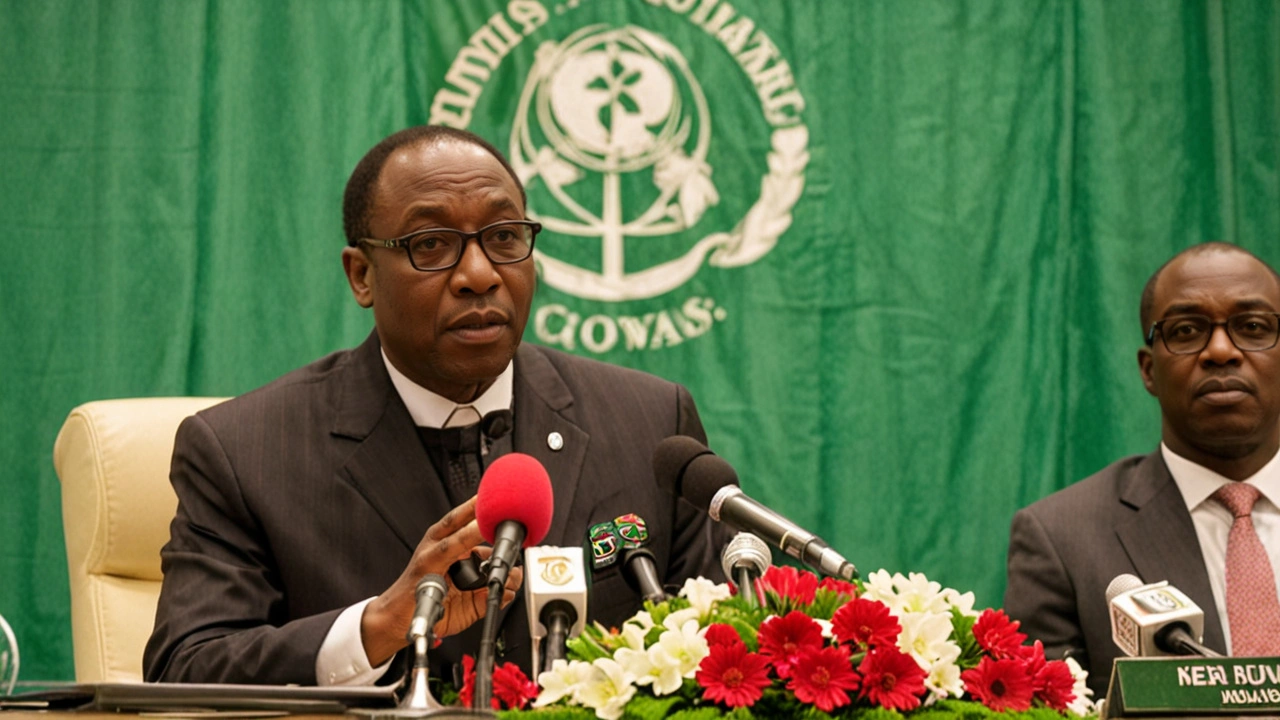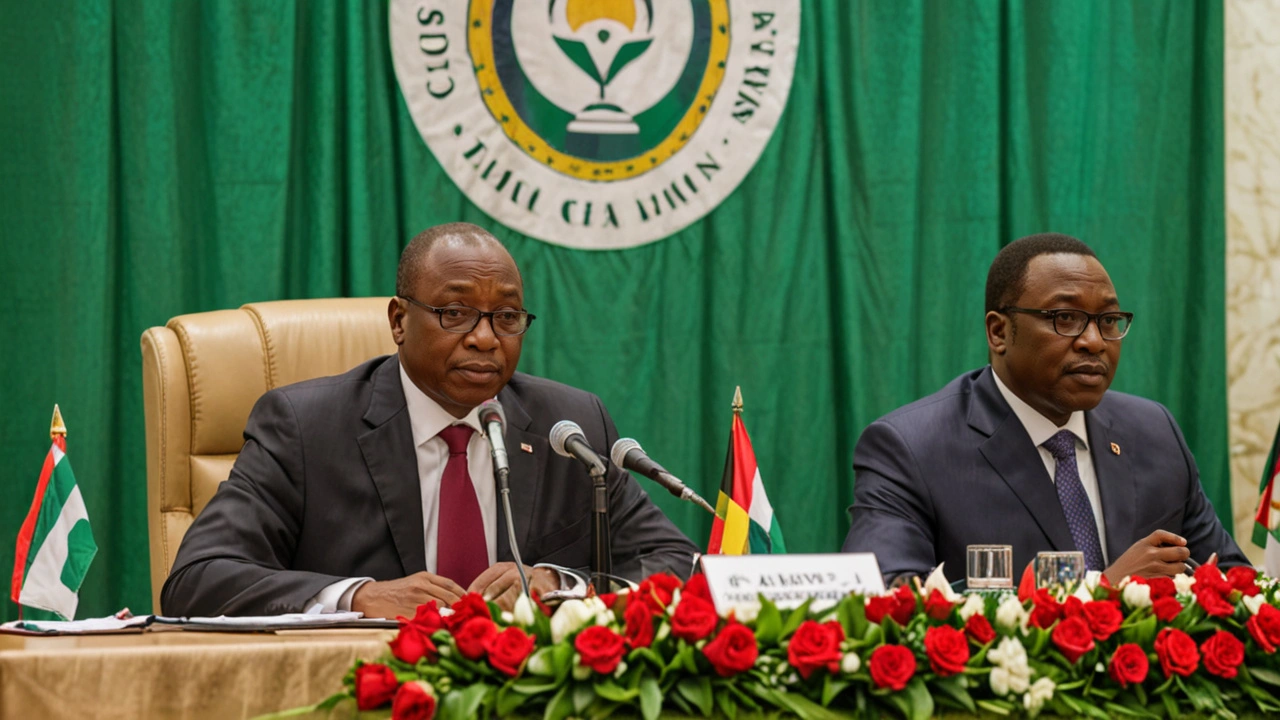ECOWAS Faces Challenges with Junta-Led States in West Africa
The Economic Community of West African States (ECOWAS) has been vocal about its disappointment over the standstill in negotiations with the military-led governments of Burkina Faso, Mali, and Niger. On July 8, 2024, the regional body expressed concerns about the lack of progress in restoring constitutional order and organizing elections in these nations. The talks, which aimed to bring these countries back to civilian rule, have encountered numerous obstacles, resulting in frustration on both sides.
ECOWAS had initially imposed harsh sanctions on the military rulers of these countries, hoping to pressure them into committing to a clear timeline for transitioning back to civil governance. These sanctions included economic restrictions, travel bans, and suspension from the decision-making bodies of ECOWAS. Despite these measures, the military regimes have shown little inclination to expedite the process. Instead, they have announced plans to withdraw from the regional organization and create an 'Alliance of Sahel States' as an alternative. The departure from ECOWAS is not an immediate process, however, as per the organization's regulations, a member state must provide a one-year notice before officially leaving.
Geopolitical and Ideological Shifts
This development highlights a growing ideological divide within the region. On one side, there are Western-backed governments elected through democratic processes, and on the other, there are military-led regimes seeking closer ties with countries like Russia. This ideological rift could strain regional cooperation, especially in terms of security and military collaboration. The potential for these tensions to spill over into neighboring countries is a significant concern for ECOWAS and other international stakeholders.
The formation of an 'Alliance of Sahel States' can be seen as an attempt by these military governments to find solidarity and support outside the traditional frameworks established by ECOWAS. This alliance could potentially disrupt the balance of power in the region and may lead to increased instability. Regional experts warn that such a shift could embolden other military factions in West Africa to follow suit, which would further complicate efforts to maintain peace and order.
Economic Ramifications
Economically, the exit of Burkina Faso, Mali, and Niger from ECOWAS could have dire consequences. The integration of markets and cooperation on trade policies are central to the economic strategies of ECOWAS member states. A departure by these three countries could undermine these efforts, leading to increased economic isolation and hardship for their citizens. Trade routes that cut across these nations would become more complicated, potentially disrupting the flow of goods and services throughout the region.
The sanctions imposed by ECOWAS have already had a significant impact on the economies of these military-led states. Restrictions on trade and financial transactions have led to shortages of essential goods, inflation, and decreased foreign investment. The anticipated exit could exacerbate these conditions, causing more economic stress on populations already struggling with poverty and limited resources.
Future Prospects and International Involvement
The international community, including organizations like the United Nations and the African Union, has also expressed concern about the situation. Diplomatic efforts are underway to mediate between ECOWAS and the junta-led states, but the road ahead is uncertain. The willingness of the military rulers to engage in constructive dialogue and compromise will be pivotal in determining the outcome of these efforts.
Moreover, the potential for increased Russian influence in the region could complicate these diplomatic endeavors. Russia has shown a keen interest in expanding its footprint in Africa, and the alignment of the Sahel states with Moscow's strategic interests could shift the balance of power. This geopolitical recalibration might necessitate a rethinking of policies and strategies by Western nations involved in the region.
Humanitarian Concerns
Underlying these political and economic discussions is a pressing humanitarian issue. The region has been plagued by violence and instability, with thousands of lives lost and millions displaced. The failure to reconcile and stabilize these countries could result in further humanitarian crises. Aid organizations operating in the region have reported increasing difficulties in delivering assistance due to the volatile security situation.
The potential for conflict to escalate and spill over into neighboring countries poses a significant risk. Countries like Ghana, Nigeria, and Ivory Coast, which share borders with the affected states, are on high alert. The regional destabilization could lead to a surge in refugees, putting additional pressure on these nations' resources and infrastructure.

Conclusion
The challenges faced by ECOWAS in dealing with the military juntas in Burkina Faso, Mali, and Niger are multifaceted and complex. The ideological, economic, and humanitarian repercussions of this standoff have far-reaching implications for the entire West African region. Whether through continued sanctions, diplomatic negotiations, or other measures, the international community's response will play a crucial role in shaping the future trajectory of these countries and the stability of West Africa as a whole.


Comments (13)
ECOWAS has a long history of trying to uphold democratic norms in West Africa, and its current frustration is understandable given the repeated delays by the juntas.
The sanctions imposed were meant to create economic pressure without resorting to military action, which aligns with international best practices.
Unfortunately, the regimes in Burkina Faso, Mali, and Niger have found ways to circumvent some of those measures, leveraging informal trade routes and external partners.
One‑year notice requirements for withdrawal are deliberately strict to discourage hasty exits, but the junta leaders seem willing to accept the costs.
The formation of an “Alliance of Sahel States” could enable them to share resources and coordination, reducing individual vulnerability to sanctions.
From a security perspective, this bloc may foster deeper military cooperation with external powers such as Russia, complicating Western strategic interests.
Economically, the loss of ECOWAS market integration threatens to raise transaction costs and inflate local prices for basic goods.
For the civilian population, these macro‑level shifts could translate into food insecurity and reduced access to healthcare.
Humanitarian NGOs already face obstacles delivering aid, and a fragmented regional framework may exacerbate those challenges.
While the UN and African Union have offered mediation, their leverage is limited without the backing of member states.
It is essential for the ECOWAS leadership to maintain a unified front while also exploring diplomatic incentives that could entice the juntas back to the negotiating table.
Targeted relief measures, such as conditional lifting of specific sanctions in exchange for concrete political milestones, might prove more effective than blanket bans.
Moreover, transparent timelines and regular reporting could build trust among the affected populations, reducing the appeal of extremist narratives.
In summary, a balanced approach that combines firm pressure with clearly outlined pathways to reintegration stands the best chance of restoring constitutional order.
The West has long pretended to champion democracy while propping up its own interests in Africa.
Now the Sahel nations are taking a stand, forging an alliance that refuses to bow to foreign dictate.
We must ask: why does ECOWAS insist on sanctions that only hurt the people, not the leaders?
Perhaps it's time to rethink who truly benefits from the current order, and recognize the sovereignty of these states.
My heart absolutely aches for the people caught in this power struggle 😢.
Every sanction feels like another weight on already struggling families.
We need compassion, not just political games!
Hope shines when we stand together 🙏.
It’s true, the humanitarian angle is often lost in the policy debate.
Even a small easing of trade barriers could lift some pressure off local markets.
We all want stability – sending good vibes to the folks on the ground! 😊
Sending love and support to everyone affected by the unrest.
These sanctions, while well‑intentioned, can sometimes feel like a double‑edged sword.
Let’s keep the conversation focused on how to help civilians first.
Together we can hope for a peaceful resolution.
Interesting point about market integration.
Need more data on cross‑border trade impacts.
Maybe a study soon?
We need to stay open to dialogue while also being firm about democratic principles.
The Sahel alliance could serve as a platform for regional security if guided responsibly.
At the same time, ECOWAS must avoid alienating its own citizens with overly harsh measures.
Balanced engagement-respectful yet assertive-offers the best path forward.
Let’s keep the conversation constructive and focused on solutions.
i think the real issue is trust
people in the west dont see the local perspective
maybe i misspelt some words but the point remains.
Honestly, the so‑called “sanctions” are just a Band‑Aid on a festering wound.
They do nothing but punish the average citizen while letting the junta hide behind rhetoric.
What’s worse is the lack of accountability from the international community.
It’s a pity how the conversation keeps circling the same tired points.
Curious how the sanctions impact everyday traders 🚚🛒.
Does anyone have recent figures on inflation spikes?
🤔💭
They want us to believe this is just about democracy, but it’s really a cover for hidden agendas.
The “Alliance of Sahel States” is a signal that the West’s grip is loosening.
Stay alert, folks-there’s more than meets the eye.
Don’t be fooled by the official narrative.
Philosophically, the notion of sovereignty clashes with external moral imperatives; yet practical realities demand nuanced compromise.
Thus, we must transcend binary thinking and craft adaptive policies.
Let’s keep pushing for solutions.